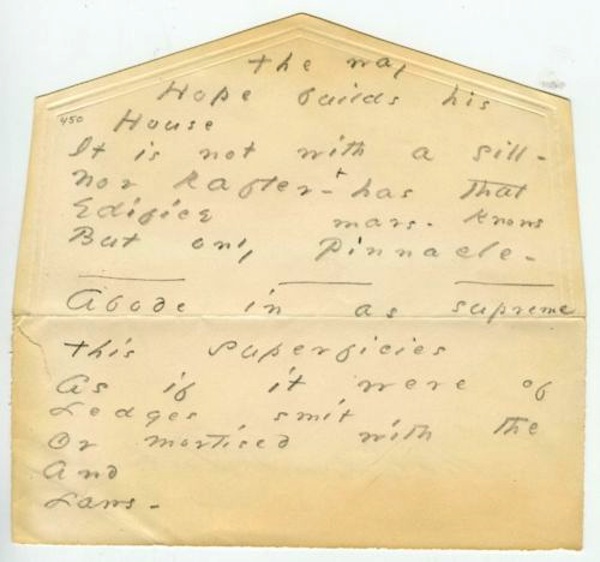【Les bas de soie noire (1981) xxx movie】
What We’re Loving: Dickinson,Les bas de soie noire (1981) xxx movie Waltz, Lupines
This Week’s Reading

I’ve been marveling over The Gorgeous Nothings, a coffee table–size book with (gorgeous) color facsimiles of Emily Dickinson’s “envelope writings”—fifty-two poems and fragments written to fit on the backs and flaps of carefully folded envelopes. Marta Werner and Jen Bervin, who edited the book, also provide transcriptions that reflect the actual position of the poems on the page (many are written diagonally, or in columns, or upside down). In her informative afterword, Werner suggests the fragments belong to Dickinson’s “late ecstatic writings.” And there is something inaccessible yet buoyant about these pieces of poetry, written on scraps that often look like the wings of paper birds.—Robyn Creswell
This past weekend, I visited a three-year-old friend (and her parents). I brought her one of my favorite children’s books, Barbara Cooney’s Miss Rumphius. The 1983 National Book Award winner is beautiful, certainly, but just as striking is its story, about an independent woman dedicated to bringing beauty to the world. It’s a classic, for sure, but more importantly, a total delight. —Sadie Stein
I read Rodrigo Rey Rosa’s The African Shorein a single night. It is a slim volume, only 136 pages, but Rey Rosa is one of the most economical writers I’ve encountered in a long time. The exactitude and concise beauty of his prose illustrates not only what the characters do but, above all, what they see and what they perceive. As Rey Rosa recently told Francisco Goldman in Bomb, “Life is just very complex and strange. Inexplicable things are always happening.” Much like the work of his mentor, Paul Bowles, who translated many of Rey Rosa’s works (and vice versa), The African Shoreis a tale of anxiety and violence but also of how fragile life can become. —Justin Alvarez
Last Saturday, I attended an event at the New YorkerFestival, the annual lineup of panel discussions, interviews, and lectures that a friend recently described as “something like Fashion Week for writers.” Heeding a patriotic impulse, I went to see fellow Austrian Christoph Waltz in conversation with Susan Orlean. I’ve enjoyed the rise of Quentin Tarantino’s silver-haired muse, and as far as cultural ambassadors go, Waltz is a clear improvement on Arnold Schwarzenegger and Hitler. Christoph didn’t disappoint: not only was he his usual urbane, hyper-articulate self, but he also managed to get in a few potshots at the Germans (in Austria, it’s how we deal with an inferiority complex regarding our neighbors to the north). Responding to the question of whether he found it easier to act in English or in German, Herr Waltz replied that English is certainly the preferable language for comedies; the unforgiving laws of German syntax make it too easy to accidentally spoil a punch line midsentence. “So there’s not a big comedy scene in Germany?” Orlean asked. “Well,” said Christoph, “unfortunately, there is.” —Fritz Huber
“They say happiness is like good health; you don’t notice it until it’s gone. Me, I was happy in 1917,” says a bow-tied Jon Hamm, sparking a cigarette as Soviet officers riffle his circa-1934 Moscow office. Suddenly, to a swell of accordion music, a tightly bundled Daniel Radcliffe likewise sparks a cigarette, this time surrounded by snow en route to a remote village. “Farewell to Moscow,” he says, “Farewell to the red and gold Bolshoi. Farewell to shop windows.” This is the world of Mikhail Bulgakov, though not that of his later dark surrealism—rather, that of a young provincial doctor scribbling grotesqueries in his diary. Black comedy permeates the connected stories of A Young Doctor’s Notebook, as well as this painfully funny new adaptation, starring Hamm as the morphine-addled Older Doctor and Radcliffe as his naive younger self. Among the show’s motifs are botched obstetrics, a gory tooth extraction, and the looming presence of Leopold Leopoldovich, a recently deceased doctor and “prolific artist” whose self-portraits cover the hospital walls. The young doctor has big shoes to fill, and an even bigger beard he can’t possibly grow. The Older Doctor mentors and chastises his younger double at one point, a dubious premise not to be found in Bulgakov’s stories, but the conceit works. “I saw a lot of horror and tragedy in here,” he says to his younger self, “Happy days.” —Adam Winters
Search
Categories
Latest Posts
'Thunderbolts*' mid
2025-06-26 12:02Vin Diesel laser cut out of ham and cheese is a sandwich masterpiece
2025-06-26 11:55This health and fitness startup is now a Harvard case study
2025-06-26 11:49Best robot vacuum deal: Save $140 on roborock Q7 Max Robot Vacuum
2025-06-26 11:15Popular Posts
Here's what my cat thinks of Spotify's customized Pet Playlists
2025-06-26 11:02Google Earth on mobile just got cosmically cooler
2025-06-26 10:55Google Pixel Buds Pro 2: $40 off at Amazon
2025-06-26 10:37Featured Posts
The internet is talking like Kevin from 'The Office' now
2025-06-26 12:33How to Reboot and Reset Android Devices
2025-06-26 11:13Popular Articles
The first social media reactions are in for DC's 'Birds of Prey'
2025-06-26 11:57Best Apple deal: Save $60 on the Apple Watch SE
2025-06-26 11:07Newsletter
Subscribe to our newsletter for the latest updates.
Comments (7341)
Star Sky Information Network
The 10 Most Anticipated PC Games of 2017
2025-06-26 12:07Miracle Information Network
Those Apple Cards are looking pretty busted just six months later
2025-06-26 12:05Wisdom Information Network
Going viral: What 7 Sundance 2020 films tell us about modern life
2025-06-26 12:01Reality Information Network
Trump walks out of executive order signing ceremony without signing executive orders because help
2025-06-26 11:02Highlight Information Network
Outdoor speaker deal: Save $20 on the Soundcore Boom 2
2025-06-26 10:59